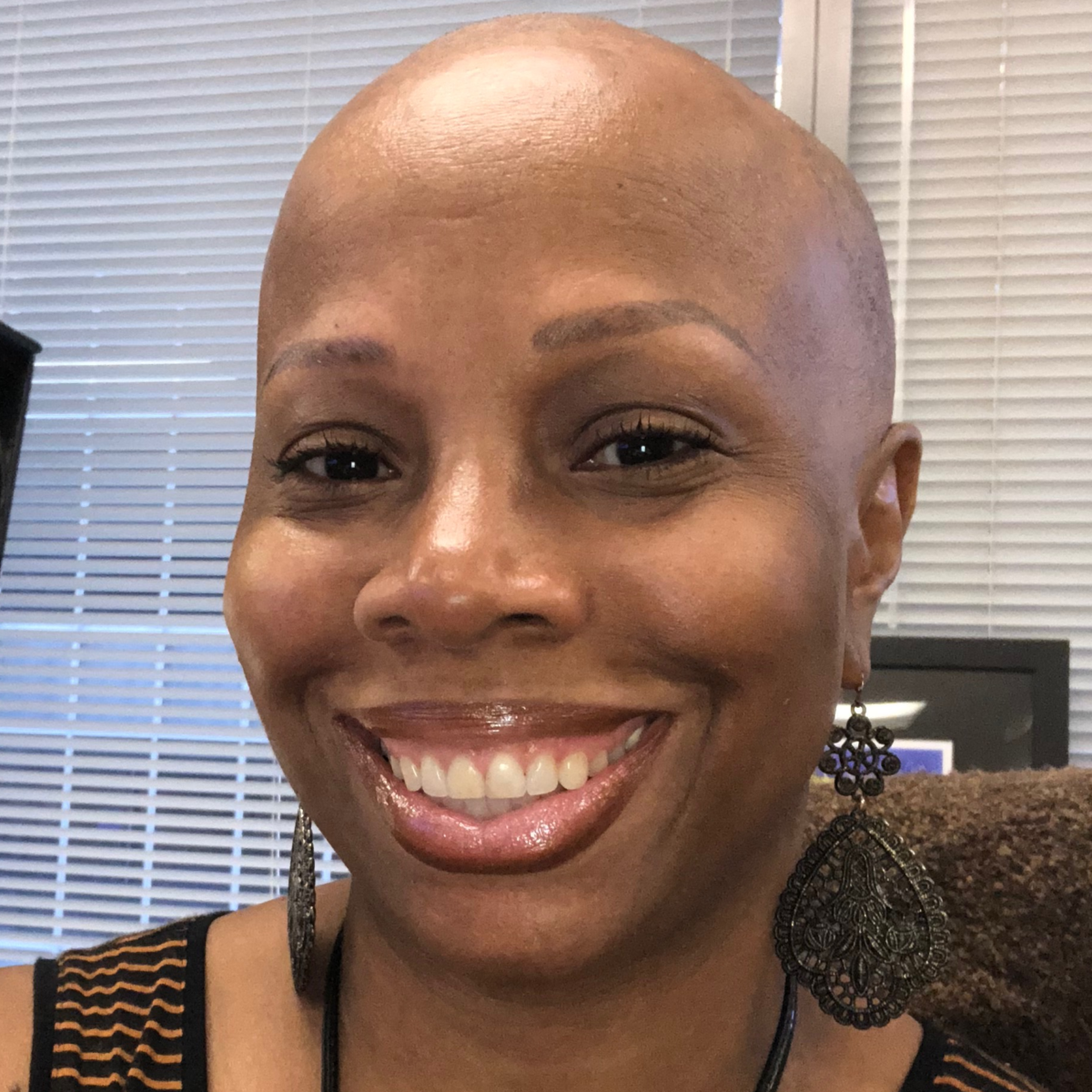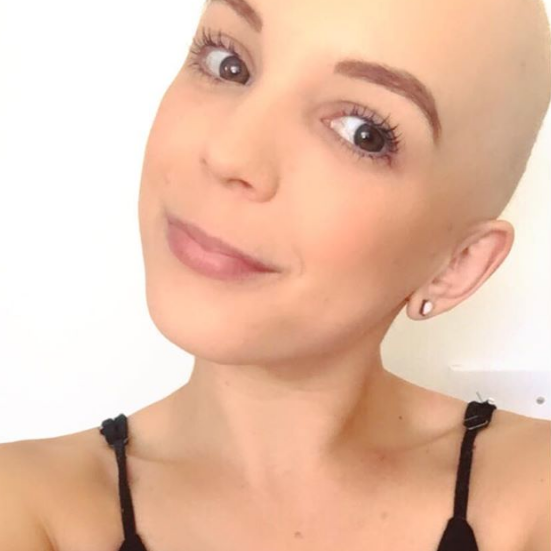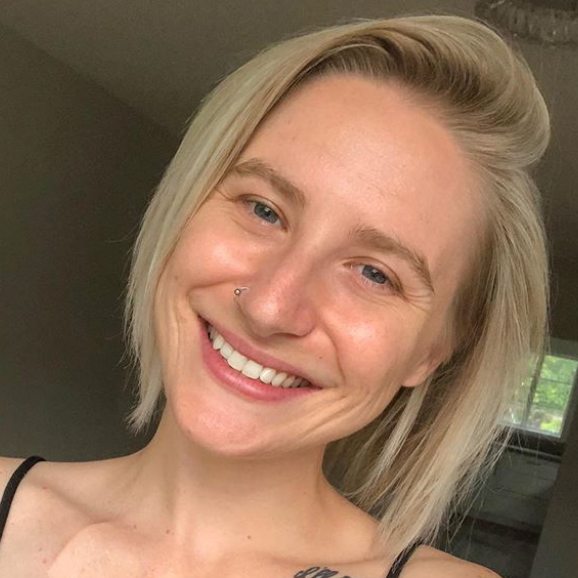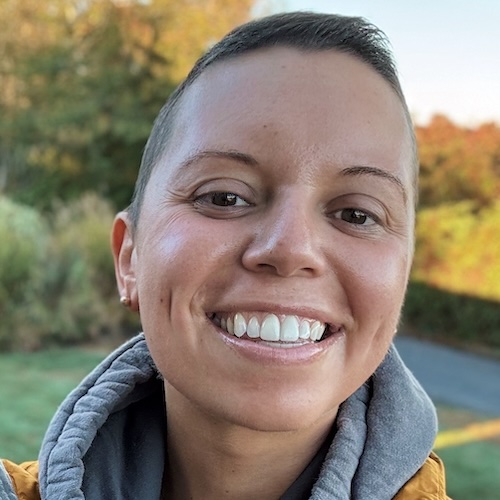Maurissa’s Stage 3 Low-Grade Serous Carcinoma Ovarian Cancer Story
Maurissa shares her stage 3 ovarian cancer diagnosis at 49 years old, undergoing five surgeries during seven years and two rounds of chemotherapy.
In her story below, Maurissa also highlights how she navigated life with cancer, like the impact of the treatment on her sexual health and life, the importance of being a self-advocate, and the difficulties of dealing with financial toxicity. Thanks for sharing your story, Maurissa!
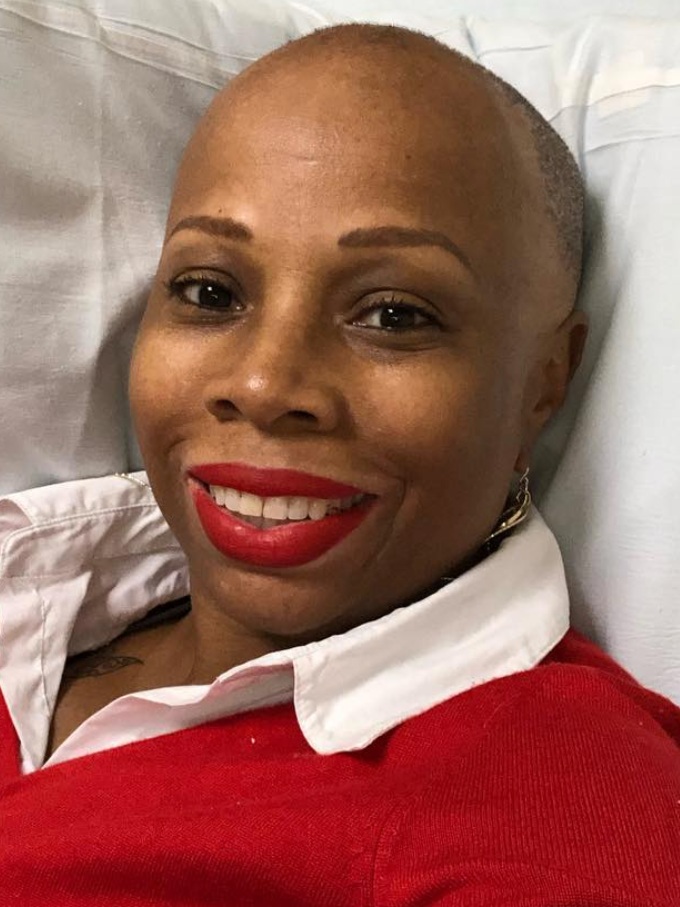
- Name: Maurissa M.
- Diagnosis:
- Ovarian cancer
- Low-grade serous carcinoma
- Stage 3
- Ovarian cancer
- Age at Diagnosis: 49
- 1st Symptoms:
- Pressure on bladder
- Throbbing pain
- Could feel growth on right side of abdominal area
- How diagnosis happened:
- Constipation and low blood count results in Irritable Bowel Syndrome (IBS) diagnosis
- Ultrasound showed fibroids
- Treatment:
- 5 surgeries
- Hysterectomy (Aug. 2012)
- Right ovary surgery (Jan. 2017)
- Surgery for tumors on colon, bladder, lymph nodes, stomach lining (Jan. 2018)
- Surgery for new turmos around abdomen (Nov. 2018)
- Scheduled surgery (July 2019)
- Chemotherapy
- Round 1: Hormone replacement therapy, Arimidex (Jan-Oct 2018)
- Round 2: Chemotherapy (Carboplatin) & targeted therapy (Avastin) (Dec 2018-April 2019)
- 5 surgeries
- Pre-Diagnosis
- Hysterectomy
- Oncology Appointments
- Second & Third Surgeries
- Describe the surgery to remove those tumors
- What was the follow-up post 2nd surgery?
- What were you feeling that indicated something was still wrong?
- Describe the January 2018 surgery
- How long was the surgery recovery?
- How was it dealing with a catheter post-surgery?
- How did it feel getting the catheter put in and taken out?
- Official Diagnosis
- Treatment Decisions
- Fourth Surgery
- Chemotherapy
- When did you start chemotherapy?
- How did you mentally prepare for this round of chemotherapy?
- Describe the chemotherapy regimen and process
- How many cycles of chemo did you undergo?
- Describe the weeks each cycle of chemo
- What were the chemo side effects?
- What helped with the chemo side effects?
- You experienced neutropenia (low white blood cell count). What helped?
- Did you do chemo intravenously, through a port, or PICC line?
- What happened after you were done with the chemotherapy?
- New Tumors
- Quality of Life
- Mental & Emotional Support
- Work & Finances
- One More Message
This interview has been edited for clarity. This is not medical advice. Please consult with your healthcare provider for treatment decisions.
I just want to say God bless you, and I’m really sorry that you’re dealing with this. It is a shocker, but I think in life things are never as bad as we imagine them to be.
Given a diagnosis is a gut punch for sure. You have to believe that you’re strong enough, that you’re able to get through it.
Advocate for yourself; this is the time. Particularly women, this is the time to be selfish and to think about yourself and to put your needs first.
Maurissa M.
Pre-Diagnosis
What were the first signs something was wrong?
I was having a lot of constipation. Then my blood count was really low. My doctor referred me to a gastroenterologist for a colonoscopy because they were thinking that that was probably the reason.
There was nothing. The colonoscopy came out fine. My blood count was still really low.
From there until the next year, I would still go back to the doctor and tell her I was having these symptoms. The diagnosis was irritable bowel syndrome (IBS), which has similar symptoms to ovarian cancer. I was also having incontinence, so I was referred to the urologist.
Describe the ultrasound process
It was called a transvaginal ultrasound. They insert the medical instrument inside you to kind of see what’s going on inside of your vagina and your uterus. It was pretty simple and straightforward. There was no pain at all.
You could see on the screen, even to the untrained eye, that there were some things going on. The technician actually pointed out to me, like, “Oh, yeah, I see these fibroids are really huge.” The urologist was doing some testing and said, “I think you’ve got fibroids.”
Luckily, my urologist was in the same building as the gynecologist, so I just had to go to the gynecologist office [to] have an ultrasound, and it was confirmed that I had a fibroid that was pretty big. It was the size of maybe if I had been five months pregnant.
The treatment was to have a hysterectomy. I was in my early 40s. I already decided I wasn’t having kids, was beyond that anyway, so a hysterectomy was the best idea for me. We did the hysterectomy, and it was supposed to be laparoscopic procedure.
The hysterectomy revealed tumors
The fibroid was wrapped around my colon. The tumor had grown so big that my ovary and fibroid were wrapped around my colon, which explained why I was having a lot of pain on my left side, particularly around my menstrual cycle.
I would have really severe cramps. When I would eat, I would get sick. It was just really, really bad.
Turned out that the mass was wrapped in my colon. They saw that there were some abnormal cells and sent it for pathology report. Turns out it was low-grade, malignant tumors. That was in August.
Hysterectomy
Describe the hysterectomy
I had my hysterectomy in August 2012. It was supposed to be a laparoscopic procedure, where they just make multiple smaller incisions on my abdomen [and] go in to remove my uterus, right ovary, my cervix, my fallopian tube, and my left ovary.
However, during surgery, my gynecologist could not remove it because it was too large. She had to request another doctor to come in. I don’t know if it was a gynecologic oncologist who came in, but another doctor to really look to see what was going on.
The surgery was a few hours, for sure. Probably longer than they had planned because they didn’t anticipate having to give me the actual large incision.
I had my surgery on a Friday. I came home on a Sunday. The pain was moderate. I wouldn’t say that it was severe. I would say that the pain was moderate. I came home.
The biggest issue that I had was coming home and transitioning from a hospital bed that was adjustable to coming home to my comfy but non-adjustable flat bed. So I had to send my husband out to buy lots of pillows to prop me up and everything.
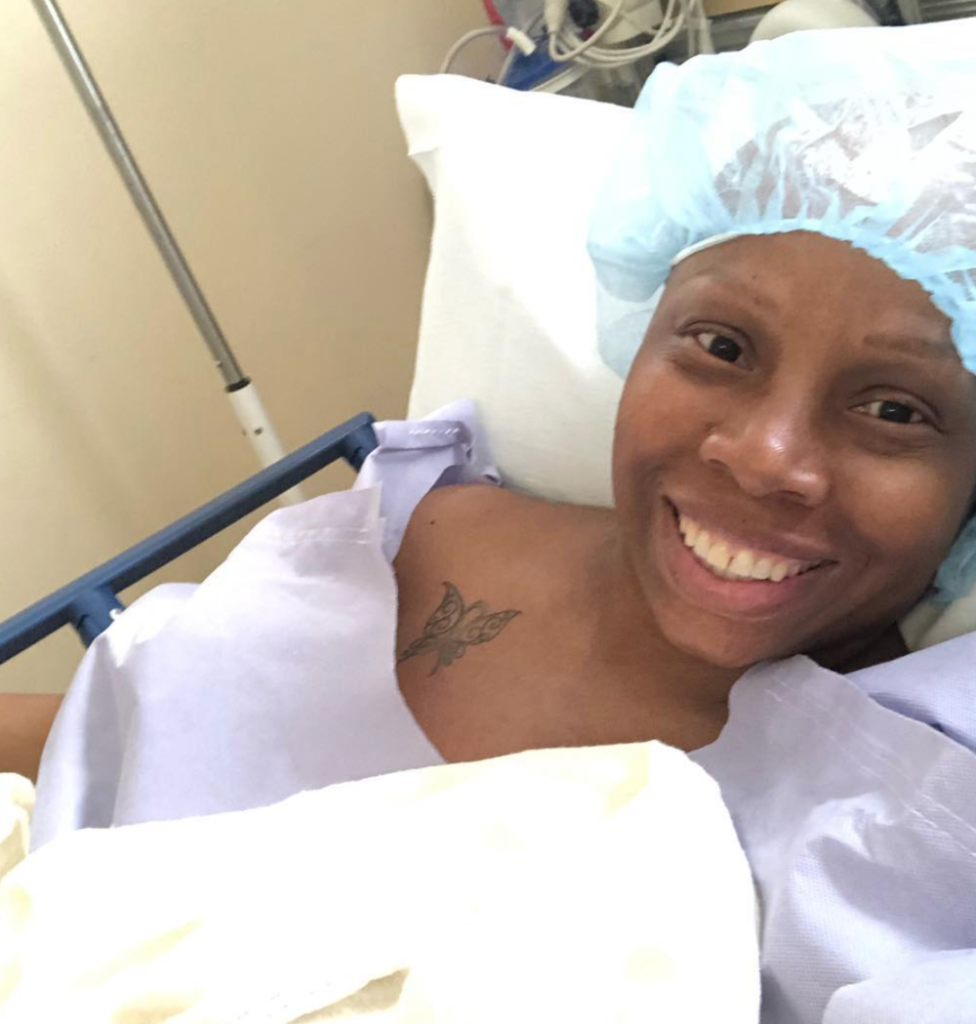
How was the recovery from the hysterectomy?
I didn’t have a lot of pain, but I did pick up an infection. Part of my stomach felt warm to the touch, so I called the doctor, and I had a little bit of an infection.
I took some Tylenol [and] some antibiotics, and I was okay. I think I was off for eight weeks, maybe 10 weeks max, but back to work. Didn’t have any lingering issues or anything.
I guess because I’d never had surgery to that extent, I felt that it was better than expected.
My recovery really included me making sure that I did a lot of walking because when they do that kind of surgery, open up your abdomen, they fill you up with gas to expand your abdomen. There’s a lot of gas and constipation, so you definitely have to do a lot of walking to get your bowels back working.
My biggest recovery was really making myself walk on days that I didn’t feel like walking. I would just walk back and forth in my house. I made a race track in my house and just walked that a couple times a day until I had the strength to go outside and walk around the corner just enough to make myself feel better. I didn’t have to do any other things, no physical therapy, nothing else.
I saw the gynecological oncologist one time, shortly after surgery, to kind of talk about what what they found in the pathology report. Then I continued to see him once a year, but my recovery was pretty much, I would say, simple. I feel like I was very fast. The only thing I said I had was the infection.
»MORE: Read more patient experiences with surgery
How long did it take to get results from your hysterectomy surgery?
I had surgery on August 24th, and by September 10th, I was already seeing the gynecologic oncologist. It didn’t take that long. I had surgery on a Friday, and I believe maybe that Tuesday, the gynecologist called to say that she was referring me to the oncologist.
Oncology Appointments
When did you have your first oncology appointment?
In September of 2012, I got to meet my gynecologic oncologist. I have been getting treatment with him ever since. When I saw him, the prognosis was very good. The percentage of it turning into cancer was less than 3%.
I had surgery in January 2013 to remove some tumors and had my hysterectomy. I had everything removed except for my right ovary because they didn’t want to put me into menopause.
What was the follow-up with your oncologist?
I would see my oncologist every year, starting in 2012. He would do a physical exam [and] ask how I was doing, and I would tell him what was going on. He didn’t feel anything.
One of the things that he did was a rectal exam. That was very helpful because it gave me relief. That’s the best way to feel on the main ovary, to feel anything that might be forming on it.
He would do that exam, a vaginal exam, asking how I was doing. I didn’t have any symptoms. I was just going to see him once a year.
I didn’t have any scans, but that doesn’t mean that that’s not common. I didn’t have any scans, and I didn’t have any blood work (I think) because it was pre-cancerous. It wasn’t cancer at the time.
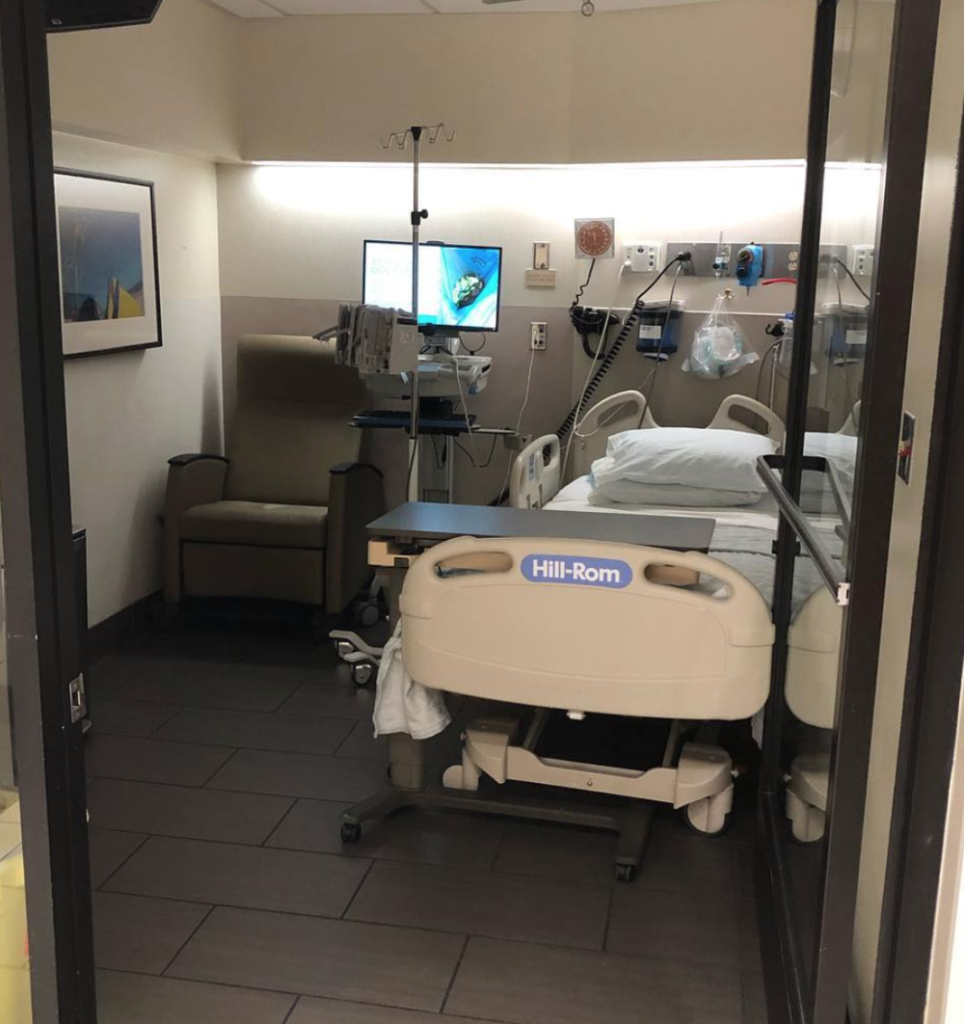
When did you feel something was wrong (again)?
When I went to see my oncologist for my follow-up four years later, I told him I was feeling something in my abdomen. When he did the physical exam, he thought he felt something, too, but he wasn’t sure.
I was always still dealing with constipation for some time, so it could have been that my bowels hadn’t passed yet. So we scheduled a CT scan.
What were the results of the CT scan?
The CT scan came back in early 2017 showing that there were some more growths. Tumors had grown from my right ovary, which had remained, and there were some tumors on the left side from some tissue.
A lot of this stuff is molecular, so they may have done the surgery, but they may not be able to get everything. They get what they can see.
Over the course of the time, some more tumors had grown on the left side. I attribute a lot to stress, honestly. Very stressful work environment. Nonetheless, the tumors had grown back.
Second & Third Surgeries
Describe the surgery to remove those tumors
I had surgery in late January 2017 to remove the tumors and to remove my right ovary. There were some remnants from my left side from my surgery.
That put me in surgical menopause, so I was doing hormone replacement therapy, where I would put a patch on my abdomen twice a week. I was doing that for pretty much all of 2017 (the year after), and then I had my surgery then.
What was the follow-up post 2nd surgery?
I just had the surgery, no chemo, no medication, still just monitoring with my doctor every six months after that.
I went in for treatment of October of 2017, and I was telling my doctor, “I’m feeling something again.” He’s like, “Well, you know what? I don’t feel anything, but we’ll monitor your charts. If you continue to feel symptoms, we’ll do a CT scan.”
Right before Christmas of that year, I did a CT scan. The doctor called back after the holiday to tell me that, yes, something had grown back again.
What were you feeling that indicated something was still wrong?
My biggest symptom was always constipation. I could feel pressure on my bladder. Sometimes it would be not a lot of pain, but a throbbing pain that was persistent.
It would come and go, but it would be a throbbing pain. I wouldn’t say that it was dull, but it was just a different type of pain. Not cramp-like.
It’s really hard to describe unless you’ve actually felt it. I was having pains in my sides. Actually, before my surgery in 2018, there was actually a growth that I could feel on my right side. I could actually physically feel the tumor on my right side. I could touch it and feel it.
Describe the January 2018 surgery
That was a big surgery. Again, no chemo, got everything out. When I went for that surgery, I was just thinking there were tumors, and so I agreed to do the surgery because we wanted to get rid of the tumors.
But when the doctor went in, there were tumors on my colon, on my bladder, in my lymph nodes, and then the peritoneum. It’s the stomach lining.
There were tumors there, so we had to remove my peritoneum. I had to have my colon dissected so that they could cut out the part that had the cancer on it.
At that time, I had colon dissection because the tumor had grown on part of my colon, and it had grown on my bladder.
Luckily, it hadn’t penetrated any of my organs. It was just attached to them, so I had a colon dissection and also had to have the cancer scraped off of my bladder.
All of the tumors were touching organs but did not go through organs, so it was pretty much localized still in the abdomen. Partially on my colon, my lymph nodes, my groin area, and my bladder.
That surgery was pretty intense. Going in, I didn’t know that there was a tumor on my bladder or on my colon to that extent. I just knew that there were tumors. I had a catheter for 10 days after that at the hospital.
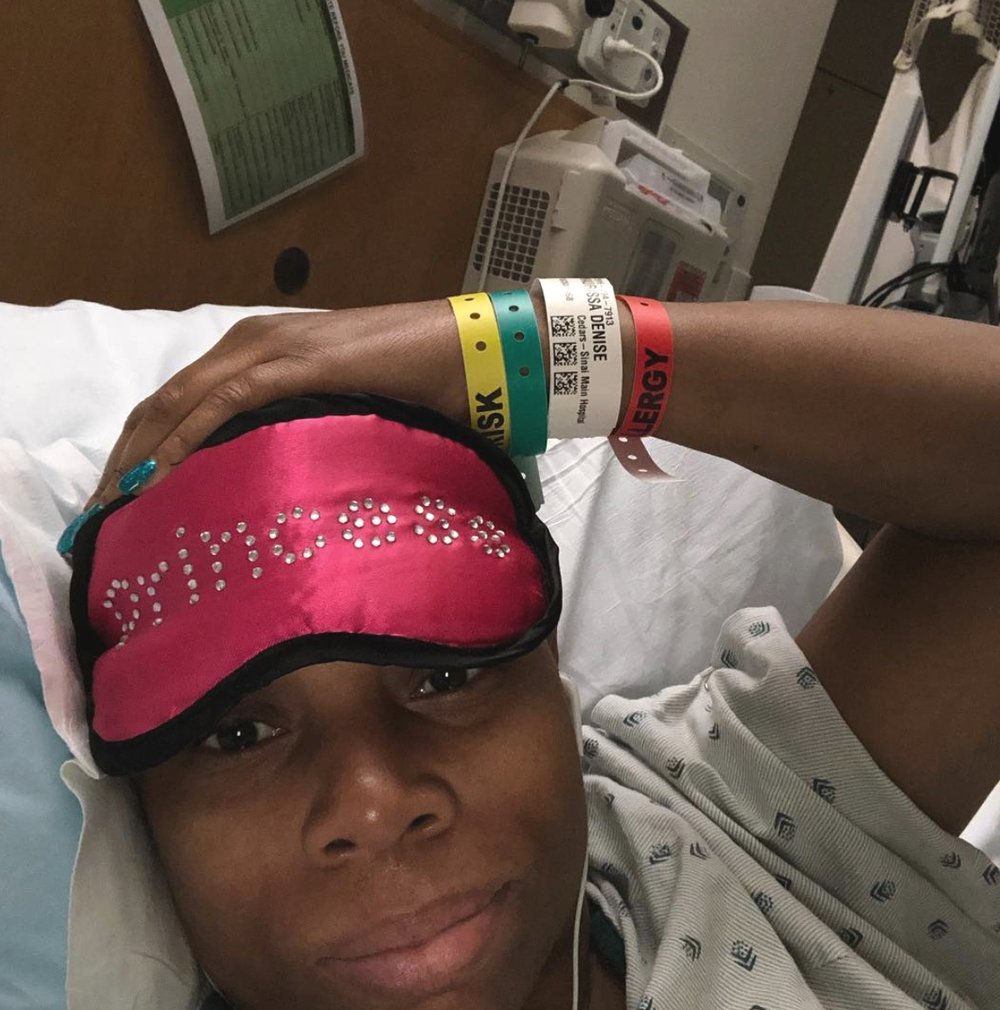
How long was the surgery recovery?
I was in the hospital for that surgery for four [or] maybe five days. I came home with a catheter bag. I had to have a catheter because my doctor didn’t want pressure on my bladder. He wanted my bladder to heal.
I also had to have a home health nurse come in and give me shots of Novamox, which is a medication that helps prevent blood clots in the abdomen, because of that type of surgery.
Other than that, my recovery was pretty simple and happy. There was a little bit of leakage from my scar, so the home health nurse helped to take care of that. When I went back to see the doctor, everything was fine, and I continued on.
At that point, I needed to see the doctor every three months because of these two surgeries that I had had in such close proximity.
I felt better probably three to four weeks after, but you still have to remember that your body is still healing, that you’ve been through a major surgery. I just took it slow because this was my second time.
In January, I had an incision cut again, called a laparotomy. That was at least eight weeks of healing. From my initial surgery in 2012, I couldn’t do any exercising, anything strenuous, or bathe.
The most I could do was walk. I couldn’t lift anything. I couldn’t lift my nieces or pick them up. The recovery process was taking it slow, walking, and not trying to do too much.
How was it dealing with a catheter post-surgery?
They send you home with a large urine bag, which you can use for nighttime, and then a small one, which you can use if you’re going to be out and about. I just had to empty my bag.
If you’re in the hospital and you have a catheter, you know [how] you have a little bag on the side of the bed? They send you home with a bag similar to that. It was mostly just taking care of that and making sure that I had emptied it. Other than that, I didn’t have any other things to do.
When I went back to the doctor to have the catheter removed, though, they fill you up with fluids, and so there’s a lot of pressure on you. You have to go back and be able to urinate for them to leave the catheter out.
If you can’t urinate, then they put the catheter back in. That didn’t happen to me, but they fill you up with a lot of water, so there’s a lot of pressure on you trying not to urinate on the doctors examination table.
Other than that, I feel like the catheter was very simple. If I put the smaller one on, it had straps. I could strap it to my leg, I could wear a dress, and nobody would know that I had it.
How did it feel getting the catheter put in and taken out?
When they put it in, I was asleep during surgery, but when they took it out, it was a little annoying, I would say. It’s not “I need medication” pain. It’s just annoying.
But everybody’s different. I sometimes think I have a high tolerance for pain or I just deal with it because I know it’s going to just be quick. The thing that was more painful or more pressure was when they were filling me up with liquid so that I could go urinate.
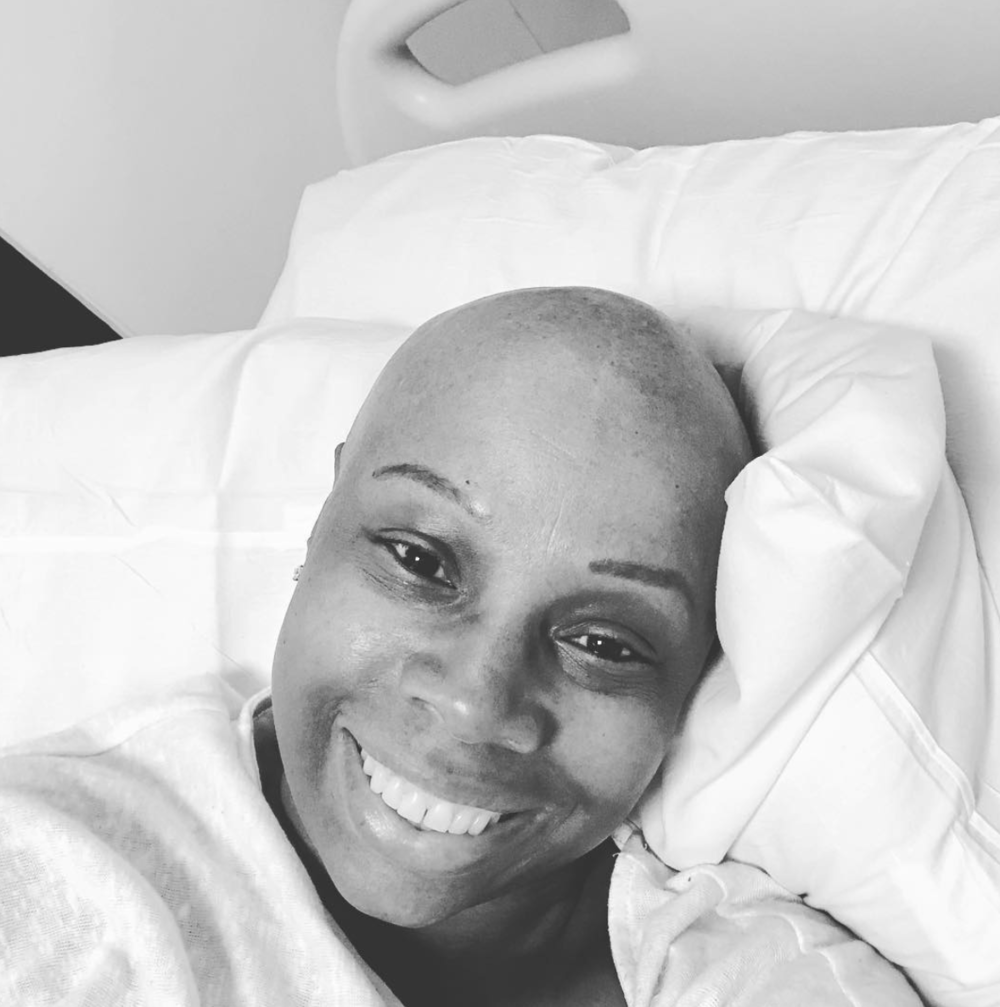
Official Diagnosis
After the surgery is when you heard “cancer” officially
It was still low-grade, borderline tumors, nothing showing up as cancerous. My ovaries were removed, but with ovarian cancer, if cancer occurs, it originated from the ovaries [at the beginning and could have spread elsewhere].
In February, when I went in to visit the doctor for a follow-up, I was told that the cells had progressed to cancer.
The ovarian cancer that I have is a low-grade serous carcinoma. It’s slow-growing, lazy cancer.
Not that responsive to some treatment types, but it’s slow-growing and so it’s easier to monitor.
How did you process the diagnosis?
I probably just heard it and didn’t really process it, honestly. I was like, “Okay, now what?” My doctor is great. Thankfully, I’d been with him since 2012, and I trust him. He’s very knowledgeable, very persistent in treatment and doing what’s right.
He just talked about ovarian cancer being a chronic disease and that with treatment, people are living longer. A lot of times we hear 10 years or whatever, so if you live 10 years, you live longer. You’re healthy, so I just thought, “Okay, it’s a chronic disease.”
I was going to be 50 in 2018. Honestly, and it might be how I just deal with it, I was like, “Okay, well, something is going to kill me.” I didn’t know what it’s going to be. I may not even make it to the car after this conversation, so I can’t really dwell on the fact that it’s cancer.
It did take me a while to say that it was cancer because up until that point, it had not been cancer. Although it had not been cancer, I have alopecia.
I was losing my hair, so I would shave it down or whatever, and people would ask me was I a survivor, was I sick, all of this stuff. In hindsight, I didn’t want to be sick. I didn’t want look sick. I didn’t want people to think I was sick.
I remember I ran into a friend and her family. I told her, “Tell your husband ain’t nothing wrong with me. I’m fine. I just cut my hair.”
I just don’t think I processed it, honestly. I had faith in my doctor that whatever treatment needed to be done, we were going to do it, and I was going to be okay.
»MORE: Processing a cancer diagnosis
How did your oncologist describe this low serous grade ovarian cancer?
He was very positive. He talked about it being a slow-growing cancer and that it’s considered a chronic disease.
I have a family of diabetes and high-blood pressure, so I’m familiar with chronic diseases. I know that they’re survivable, and this cancer is survivable. It may not be curable, but it’s survivable, and so I was optimistic about that.
We talked about some treatment options, which was to take an [aromatase inhibitor], a medication that reduces the estrogen in the body, to see how that worked. Because I was not symptomatic, I’m going to continue to do that. However, they scheduled another CT scan in about six months.
I went for my CA 125 blood work, the blood test that shows what your cancer antigen level is. It’s not really a diagnostic test, but it’s an informative test.
My CA 125 was increasing, so I ended up having to go through the CT scan in early October. It showed cancer all over my abdomen. Everywhere. It was just everywhere.
There were some back on my colon where they had done the dissection. There were some on my colon, in my lymph nodes. There was a huge tumor pressed against my kidney. It basically was all over the place.
When we came back and talked about that, my oncologist said, “This is what we’re going to do.” He tells you what’s going on, then tells me about the options, and then waits for me to say what I want to do.
I think at that point I had started doing a little bit of reading about the type of cancer it was and getting a little bit more knowledgeable about it. I kind of knew that surgery plus chemo was the way to go.
How did you break the news to loved ones?
My husband and I had filed for divorce in 2017, so he wasn’t with me. My stepfather was with me.
My stepfather has been with me for most of my big appointments up until that point, so he was with me in 2012 when I first went to the oncologist. I think he was with me when we found out that I had to have surgery again. He took me to my later surgery
He’s been with me at a lot of my appointments. I take him because sometimes he can be emotionally not detached, but he can separate the two. He’s very, very smart, so I found out, took him, and then I started sharing.
Earlier in 2018, I had done a video about me being at the hospital. Even though the medical diagnosis was ovarian cancer, I was certain that I was going to be healed. I left it at that.
I don’t even know if I shared with people that it had transitioned to cancer, or if I did, I may not have put it on Facebook at that time. I think the people around me, people at work, I may have shared the transition to cancer, that I was taking some medication, [and] the prognosis was good.
I’m the second oldest of four children, all boys except for me. I have two younger brothers, an older brothers, and several nieces.
When I told them, I just had to say, “Honestly, we’re all going to die. I know that it just sounds really simple, but it’s like we’re all going to die.”
That’s how I comforted them. ‘I’m not worried about it to that extent; don’t you worry about it to that extent.’ That’s not to say that I don’t think about it, but I try really hard not to worry about it.
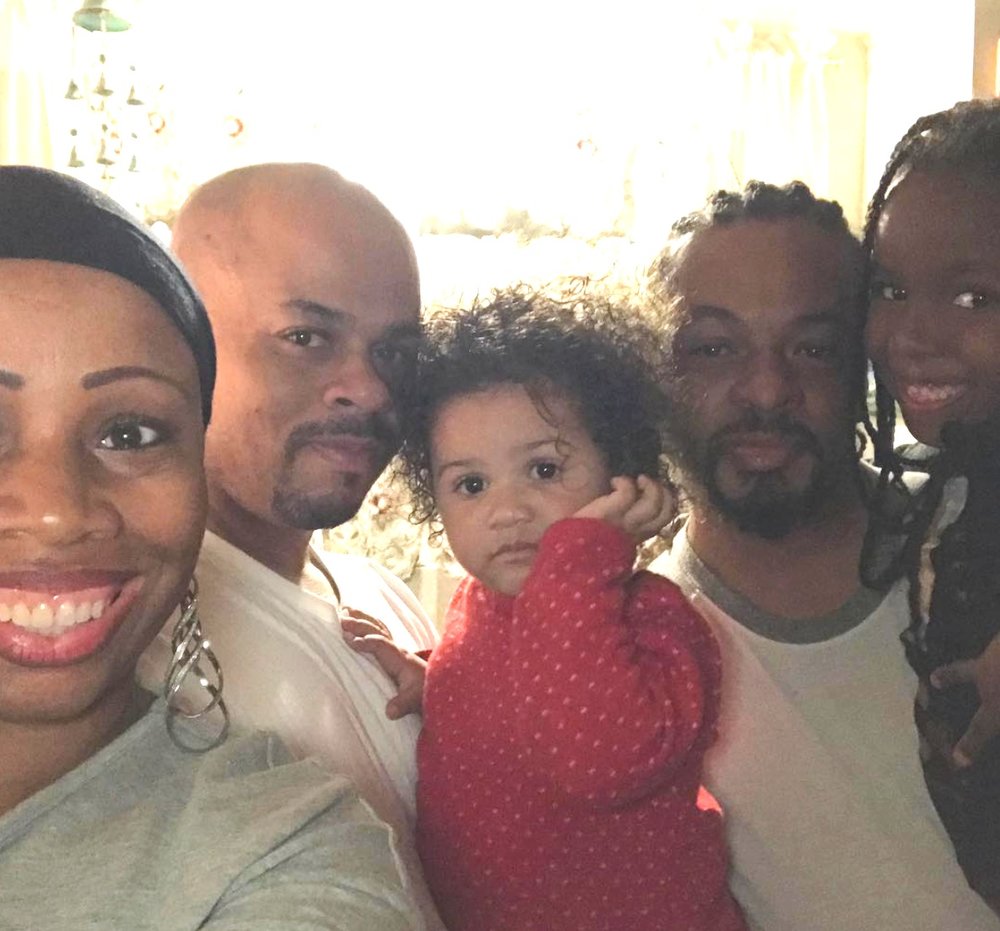
Treatment Decisions
How was the treatment decision-making process?
It was pretty straightforward for me. Each time we had a conversation, it was like, “All right, let’s do surgery.” As we moved towards my later surgery in November of 2018, we had another conversation. I was like, “Well, let’s do surgery.”
Did you consider a second opinion?
No, I didn’t. Fortunately for me, I have really good medical insurance. A part of my insurance allows me to go and receive treatment at Cedars-Sinai Hospital, which is a world-renowned hospital, very advanced. A lot of celebrities go there.
My doctor, my oncologist, graduated from University of Texas Anderson Medical School, which is one of the leading schools for gynecologic cancers, particularly ovarian cancer.
My doctor had spoken with one of the leading doctors who studied ovarian cancer, showed him my results, and talked about different things, talked about treatments. I’ve always felt comfortable with my doctor.
My oncologist is very forward. He’s very bright. My stepfather, who’s a really good judge of character, felt comfortable with him. A second opinion just never crossed my mind.
It is what it is. The CT scan shows what it shows. I already had surgery with this doctor. When I had my hysterectomy, I had just met that gynecologist. At least with my oncologist, I had a several-year relationship with him.
Describe the maintenance therapy that was prescribed
We started doing some maintenance therapy with Arimidex. There’s another popular drug that they use, I think it’s tamoxifen. My CA 125, which is the blood test that they use to measure to see if the cancer antigen is there, doesn’t necessarily say that you have cancer, but it’s just a marker for ovarian cancer, so looking to see was it increasing? My number was increasing. It had steadily increased.
Fourth Surgery
You underwent a fourth surgery
I had a CT scan in May 2018. My number continued to increase, so I had another CT scan in October, where we saw that some more tumors had grown. Basically, it was just all over my abdomen, everywhere.
So I had surgery again in November.
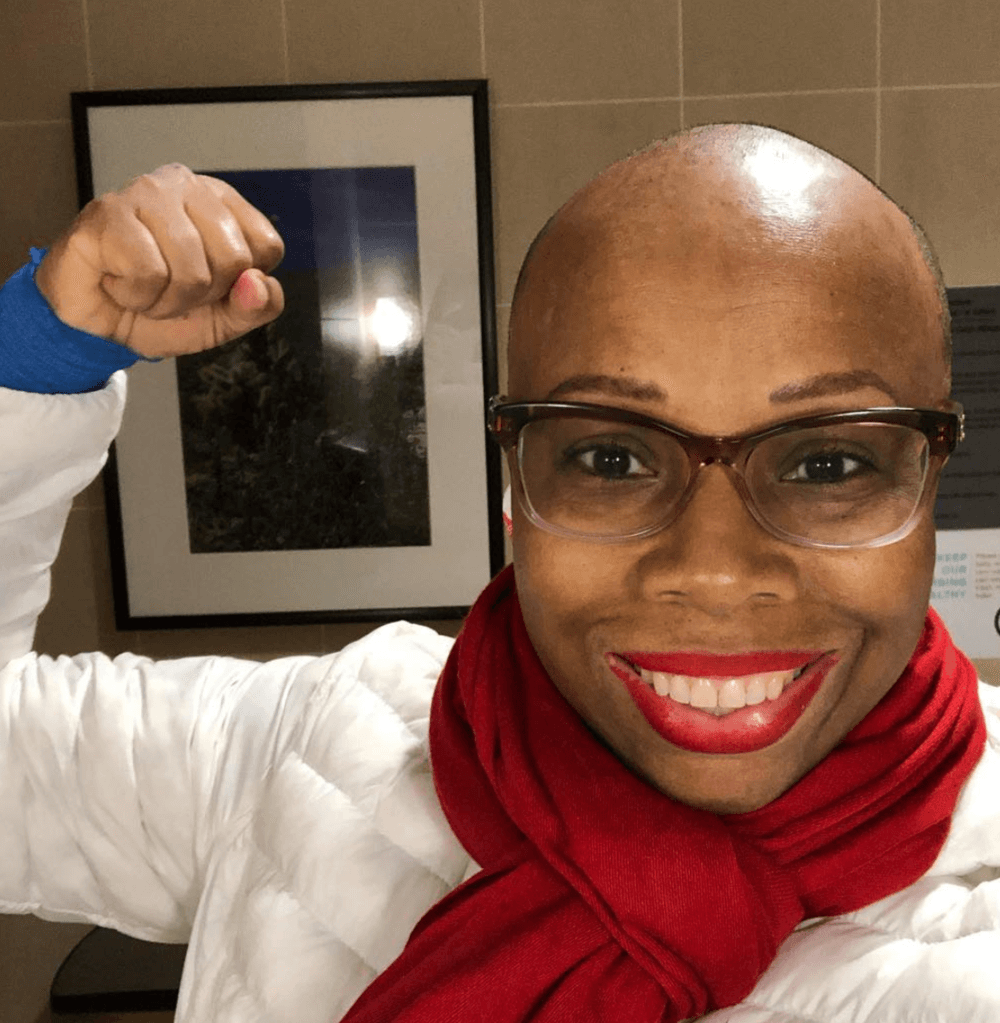
When did you have the surgery?
I wanted to celebrate my 50th birthday without having to have any recovery or anything like that, so I postponed my surgery until November. Three weeks later, I started chemo.
What was the prep before surgery?
There’s really no prep before the surgery, honestly. It’s just not eating after a certain time at night. I didn’t have any other prep to do.
Fortunately at that time, the doctor took me off work. I requested to be off work, so I was off work for a month before I had the surgery.
There was a lot of emotional stress at work, and as I mentioned, my husband and I were going through a divorce. It was a lot of stress and a lot of internalizing of feelings and emotions and all of those things, which I personally believe contributed to the ongoing growth of the tumors.
The prep work for me was really just getting my mind set for the surgery and preparing to be off work, which I was really excited about at that time. I’m still excited about it because the difference that I feel between now and having to be at work and dealing with this is like night and day.
What happened when you got to the hospital for the surgery?
I have high blood pressure, so I had to have an EKG to make sure my heart functioning was fine.
You see the anesthesiologist, they give you your anesthesia, [and] they make sure that you know what you’re having surgery for. I’m telling you, before they even wheel you from the pre-op room to the operating room, you’re gone.
You’re asleep, you’re out of it, and then you wake up in recovery.
Describe this surgery
We knew chemo was going to be the treatment, so my surgeon left the tumor. I think I mentioned before I could feel the tumor on my right side.
He removed that in January of 2018 and it grew back again, so he didn’t remove it in November. He left it there to use it as a physical marker to see if the chemo would work.
There was still some tumor left on my colon because of the chemo medication that I was going to be getting. They didn’t want to do another colon dissection because one of the side effects [of the medication] is bowel obstruction, so they didn’t want to put me at risk for that.
This surgery was the first surgery I came out of where there were actual tumors that they could see that they had still left there for me. They took out what they could. There was a large tumor that was in my abdomen, so they took that out and took out from the lymph nodes.
»MORE: Read more patient experiences with surgery
How long was your recovery from surgery?
I was in the hospital probably about three or four days. I had to have a home health nurse come home and give me the Lovenox injections (blood thinner) to help prevent blood clotting.
Recovery was pretty much the same, except for now I was preparing to go into chemo, which was really, I don’t want to say scary, but a little. There was the fear of the unknown. Not really knowing what it was going to be like, how I was going to feel, and all of those things.
Was this recovery similar to your previous ones?
They were all very similar.
When I was in the hospital, I was pushing the morphine drip. It seems like I would fall asleep and wake up when it was time to push it again. But after that, they transition you off the morphine drip, and then I came home on medications.
I was on Percocet, so I was on a strong narcotic medication. After three or four days, I would stretch out the time period a little bit longer and longer before I would take the medication. Instead of taking it every eight hours, maybe I’d take it every ten hours or something like that until it got to the point where I didn’t have any pain at all.
I had to force myself to keep taking the pain medication, honestly. Each surgery ended up with extra pain medication because I never ended up taking it all.
What I had learned from my first surgery was even if you’re not in pain, continue to take the medication at least the first several days, so at least the first week, so that your body can heal.
Any last tips about surgery?
I’ve been fortunate. The surgeries have gone well. I haven’t had any side effects from the surgeries at all, aside from the minor infection I got after my first surgery, but I haven’t had any side effects at all.
Make sure that you have somebody there when you come out of surgery who can ask your doctor questions and get the information correctly, because when you come out of surgery, you’re not thinking about asking questions. You’re still kind of out of it, and there is pain, so you’re still trying to recover.
I’m usually out of it the first two days. It’s interesting. I’m alert, but I’m out of it. I even come out of surgery, [and] I’ll talk to you. I’m aware of where I am, but you can still tell that I’m really drowsy and everything else.
Chemotherapy
When did you start chemotherapy?
I started chemo about three or four weeks after my surgery. I don’t think he wanted to wait five weeks.
Because of my insurance, I had to do my lab work off site, so I had to do my lab work two days in advance. Most people would probably do their lab work on the day of chemo because their insurance would probably cover the lab at their particular hospital, but my insurance doesn’t cover that. They contract out with a particular laboratory for blood work.
I would do my blood work two days in advance, do my CA 125. They would do a blood chemistry and then a metabolic panel just to see what was going on. They were looking to see what my CA 125 was, what my white blood count was, what my red blood count was, and because I was having some issues with my kidney, to check my kidney function.
If everything was good — they’d make sure that your white blood count cells are at their appropriate level — I could have chemo.
My only experience with chemotherapy was with my grandmother over 20-plus years ago. She was 75 at the time, and she had one chemo session, ended up being in the hospital, and just said, “I can’t do it.” She died six months later almost to the date that she was diagnosed with lung cancer.
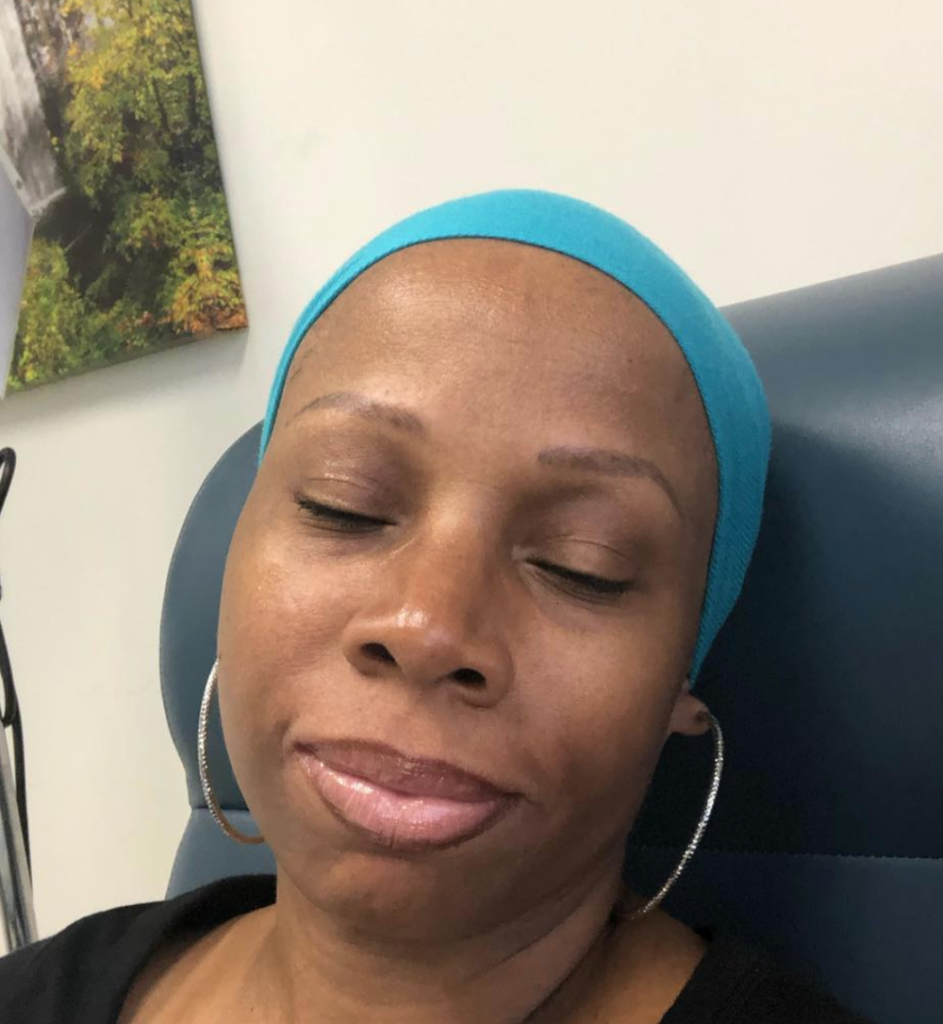
How did you mentally prepare for this round of chemotherapy?
That was my only knowledge of what chemo was like aside from what you see on television or anything like that. I was really more concerned about what it was going to be like, how I was going to feel, and would I be able to make it through the treatments.
Describe the chemotherapy regimen and process
On my chemo day, I would see my doctor and my oncologist nurse practitioner. We’d talk about how I was feeling, talk about what to expect, and check my blood pressure. After I saw them, I would go over to the infusion center.
Fortunately for me, my gynecologist is right there and the infusion center is right there, so I just go over to the other side to the infusion center.
Because my chemo was so long, I was getting three chemo drugs. You have pre-chemo drugs, so you get Benadryl, you get a steroid, you get some other medications in there to kind of get you going, and then you get a regular IV.
Then they start with the treatment. What your treatment is determines which medication they would start first. I was on carboplatin and Avastin.
Avastin is not a chemo drug, but it’s another drug that targets the cancer cells to kill them off. The first day the Avastin is 90 minutes, and if you don’t have any side effects, then they decrease it to 60 minutes and then 30 minutes for your subsequent treatments.
Then one of the drugs was an hour infusion. The other was a three-hour infusion. I was literally there the first day all day because I had a late appointment and my chemo didn’t start until the afternoon, like 1:30 p.m. or 2:30 p.m. I didn’t leave until 9:30 p.m., close to 10:00 p.m., maybe later than that on the first day.
Because my chemo was so long, I was in a bed. I actually got to lay down and have my chemo in — I don’t want to say a private room, but there are rooms within the infusion center where some of them had beds. Some of them had where you would sit up.
Then they have another side that’s called short term, where everybody would sit up, but they had chairs that could lay down almost like a bed. Fortunately for me, for the majority of my chemos I was in a bed.
How many cycles of chemo did you undergo?
I had six cycles. I just finished my last cycle. It will be three weeks tomorrow that I finished chemo. Woo hoo! Absolutely, yes, thank you, thank you, thank you.
Describe the weeks each cycle of chemo
I would get my chemo on Friday, and then usually by Monday or Tuesday is when I would feel the side effects. Sometimes I started a little bit on Sunday, but then for sure Monday or Tuesday, and then by Thursday or Friday of the first week, I would start to feel better where I could actually get up and go out of the house.
Usually by the second week, I was feeling great. I had to slow myself down, honestly. Then by the time the third week came around, I was feeling awesome. Then it was like, ‘Oh, it’s chemo time again.’
This was pretty much the same for all six cycles. That the first week would be the toughest week for me. My third chemo cycle was the absolute worst chemo because it took about two weeks for me to really get it back together.
What were the chemo side effects?
- Bloating
- Fatigue
- Pain in joints, legs
- Neuropathy
- Itching
- Appetite loss
- Nausea (especially 3rd cycle)
- Stomach issues (diarrhea & constipation)
My symptoms were bloating — I looked like I was pregnant — severe constipation. Sometimes when I would eat, I would feel really sick. I would get full really fast. I was fatigued. I didn’t realize.
In hindsight, I realized how tired I was after I had surgery. As women, we just keep on going. I didn’t realize how tired I was, but I was fatigued.
Some days it would take everything I had to get up and go to work. I would be two or three hours late to work because I just couldn’t get up. Maybe I had insomnia or something.
After my first chemo, the major side effect was fatigue, of course, but there was also pain. They suggest that you take vitamin B-6 [and] L-glutamine to help with the chemo pain and then to help ward off neuropathy.
From my experience, sometimes taking that exacerbates the pain. The first cycle, I did exactly everything they told me to do. I took my B-6 twice a day, I took my L-glutamine. You’re supposed to [take that] three times a day, but it was powder form that you mix with like two ounces of liquid and swallow that, so that didn’t go well.
I don’t think I ever took all three of my L-glutamines a day. The first cycle I had lots of pain. Joint pain, leg pain, just pain, bone pain. I would have some stinging of neuropathy, like pins and needles in your toes and in your fingers.
I would have itching. I’ve had itching around my wrist, around my ankles, and on my inner knees. On the inside of my knees, I would have itching.
Those were pretty much the same for the first two chemos. After my first chemo, I told my nurse about what I was having. They reduced the B-6 and reduced the L-glutamine, and the pain was not as bad. The itching continued.
After my third chemo is when I started to lose my appetite. That was really bad. I was weak, I was losing my appetite, and I was still dealing with the itching and the pain. But by that time, I knew the pain was going to be here for a couple of days. The world is not going to end. You’ll be okay.
But the feeling of nausea that third chemo was really like, ugh. The third chemo was really bad because I felt nauseous, but I didn’t have an appetite, so my stomach just didn’t feel right for several days.
I ended up actually even having to take some anti-nausea medication. My doctor gave me two anti-nausea medications, and I took the whole time on chemo maybe three pills for anti-nausea. Fortunately for me, I didn’t have a lot of nausea.
After the fourth chemo is when I started to feel a lot of stomach issues. Diarrhea in addition to the other things that I was feeling. The fourth, fifth, and sixth chemos were just dealing with the stomach issues. [That] was the biggest problem for me.
»MORE: Cancer patients share their treatment side effects
What helped with the chemo side effects?
With my first cycle, I was drinking a lot of ginger ale. I stopped that because I think that was adding to the itching.
Before my fourth, fifth and sixth chemo, I would buy just good old chicken noodle soup or chicken with rice soup. That would be able to help me because I was hungry still. That would help me have something in my stomach.
I definitely avoided fried foods. I had to learn that the hard way. I was craving fried food. It would irritate my stomach. That would really irritate my stomach.
I didn’t take any other medication for the diarrhea. What I took for constipation was MiraLAX or Senna.
I tried to get my water intake up. After my third chemo, it was hard to keep my water intake up to a gallon of water a day. It was just hard to do those first several days.
I would have indigestion, so I would end up taking Tums at night. I would say have some Tums, have some Imodium AD, have something for your stomach like Pepto-Bismol, whatever it is that you use in case you need it.
I just knew it was something I had to go through for three or four days, where literally I would eat something, and once it hit my stomach I would have to go to the bathroom and have diarrhea. That was just how it was for like three or four days.
You experienced neutropenia (low white blood cell count). What helped?
After my first infusion my white blood count went down, so I couldn’t get my infusion that following three weeks. I had to wait a week, and then I got my infusion. Then they put me on what’s called Neulasta.
It helps to increase your white blood cell count. It gives you a boost. I got that, and then my subsequent chemos were fine up until I think my fifth infusion, [when] I had to have Neulasta again. You can get a shot, or it’s a little patch.
I came home with a patch, and it would work overnight. I say it’s a patch, but it’s a little needle under a patch that sticks into your stomach. The medication is going through that.
You can’t feel it or anything. The only thing you feel is the little needle popping you once it sticks in. But you go home with it, and it goes in overnight. I think you can get a shot, but I didn’t get the shot. I just got the patch instead.
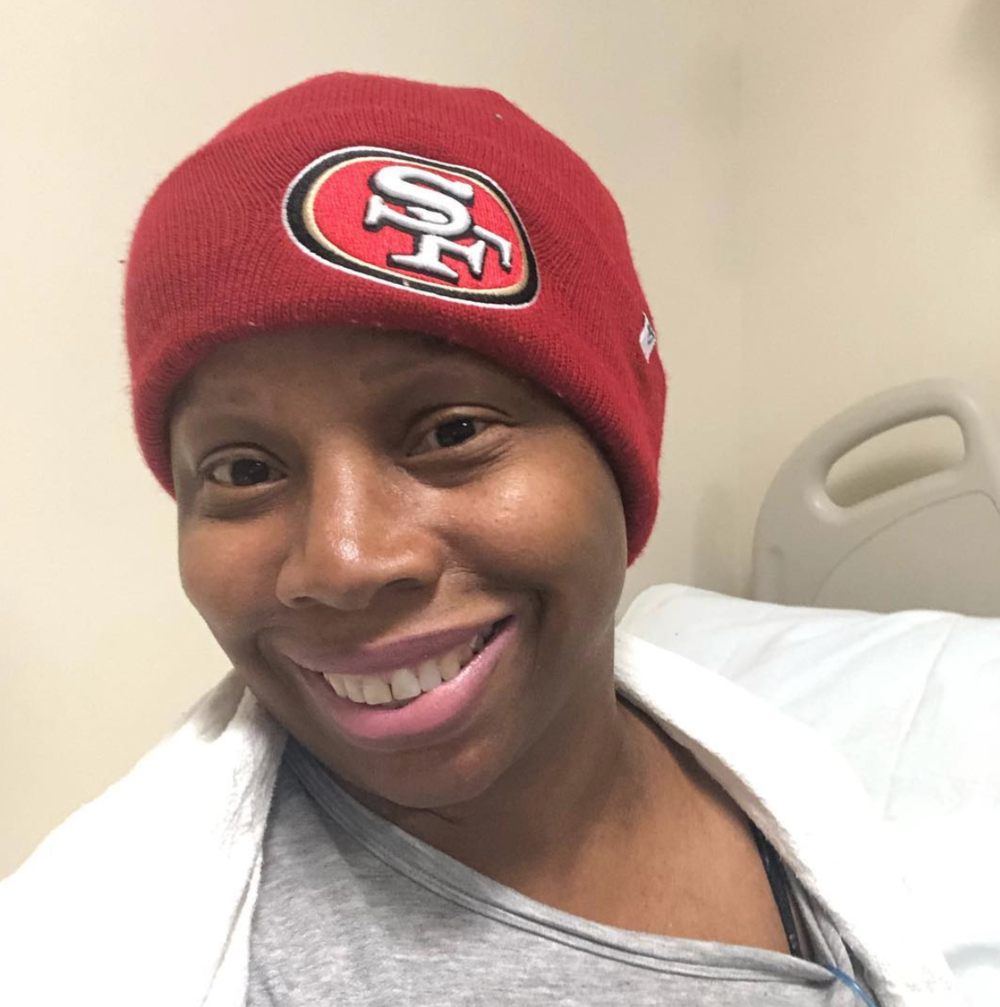
Did you do chemo intravenously, through a port, or PICC line?
My chemo was intravenous, and then I ended up getting the port after my second chemo because they had to put the IV on my wrist, right at that bone, because they couldn’t find a line for me. I did get a port in my arm. I still have it.
»MORE: Read more PICC line experiences
What happened after you were done with the chemotherapy?
I finished my fifth cycle, and at that point my CA 125 was at 47. The goal is to get it to under 30, so we knew that we still had some ways to go. The plan initially was for me to do three chemo cycles, have my CT scan, and then do an additional three cycles.
But I was progressing well with the chemo. The tumor that they had left on my right side, I could feel it shrinking.
I could feel it actually shrinking, and so because we knew it was shrinking [and] we knew the chemo was working, we postponed the CT scan until after my sixth chemo.
New Tumors
What was the follow-up treatment plan?
They told me what it was and that we were going to do hormone maintenance to block the estrogen. They put me on a medication called Arimidex.
During that time, I was getting my CA 125 test done. They put me on Arimidex, and my number wasn’t going down. Then they put me on tamoxifen, and then my number still wasn’t going down.
In between that time, I was seeing my primary care physician just for my regular annual exam, and she noted that my kidney function was a little bit lower than it could have been. She talked with my oncologist, and they scheduled a CT scan, where they saw that there were some more tumors. They weren’t large enough for me to have any symptoms.
Describe the post-chemo CT scan
To prepare for the CT scan, you can’t eat three hours before your appointment. Then you go in, [and] they give you this smoothie to drink so that the barium will coat your organs. Then you go in, you get your IV, [and] you do your CT scan.
Then you wait for the results. I had my CT scan on Wednesday. My doctor called on Monday to say that the scan showed that there were still some tumors there, that the chemo worked, [but] there were still some tumors there.
I don’t know if he offered surgery or if I said that I wanted to have surgery again. I think he said I could have two additional chemos to see if my CA 125 would go down below, get it to the 20s.
How did you feel hearing that there were still tumors?
I was actually sad. I started tearing up, honestly. I think that was the first time that I really teared up after talking to the doctor.
Usually I was like, ‘All right, yes, let’s go, this, this, this.’ But this time, I just felt like, ugh. I had just gotten to the point where this was my first time where I didn’t have to have chemo in three weeks.
I didn’t have anything to do. I didn’t have any appointments; I didn’t have anything. I could kind of get my life back going.
My time off is extended until August, so I was looking to get back into exercise and do some other things to prepare back to enter the workforce.
To just to have to have surgery again, I just have to deal with it some more. It made me sad. To be honest with you, I felt sad. But after I processed it and talked to my brother — my brother is very positive. He’s like, “Well, that’s good news, right?” I’m like, “Well, yeah, I guess it is good news.”
My CT scan that I had was a chest and abdominal CT scan, because with this type of cancer, people get lesions on their lungs. With ovarian cancer, it will spread to other organs within your torso.
The fact that I had a CT scan of my torso basically, that there’s a 5cm mass in my pelvic area, and there’s still some tumors in my lymph nodes — that’s pretty good considering all of the other space where there could be tumors. But I was still pretty sad about it, to be honest with you.
How did you process the news?
I told the doctor, “Give me a few days to just process. I want to go on vacation. I want to do something.” Because doing chemo every three weeks, your life is almost limited.
Fortunately for me, I’m off work, which I’m extremely grateful for. People who have to work, I don’t know how they do it. [It’s hard] to be able to have your life back, and then it’s like your life is back, but you still have to go through some more treatment.
»MORE: Read different experiences of a cancer diagnosis and treatment
You decided to do surgery instead of more chemo
For me, surgery has just been easier. The type of cancer that I have is much more responsive to surgery than it is to chemo, so the fact that it even responded to chemo is awesome in itself.
After my last chemo, mentally I had prepared for no more chemo. The thought of having to do chemo again was just like, uh-uh (negative), I can’t do that. I’d rather just have surgery.
What are the next steps?
The plan is for me to have surgery and then go on the estrogen reduction, to go on Arimidex again. There’s no plan to do additional chemo, but I’ll talk to him about that and to see if there’s another plan to do another CT scan to just make sure that everything was removed.
Quality of Life
How did you deal with losing your hair?
I’ve had hair loss about four or five years because I’ve been dealing with frontal fibrosing alopecia. I lost my hairline and then my eyebrows.
Going into chemo, hair loss was not my concern. A lot of women are concerned about hair loss, and they’re doing everything they can to prevent hair loss. I wasn’t concerned about hair loss.
Then one day, I was taking a shower, I was cleaning my lady parts, and I was like “Oh my god, I’m losing my hair.”
It kind of caught me off guard because I had completely forgotten about that as being a side effect of the chemo.
But you do lose all of your hair — everywhere. I lost my hair on my private parts. My hair under my arms had always been kind of thin, but that hair is gone.
There’s no hair on my legs. My bottom eyelashes are gone, and my top eyelashes bend up. I didn’t lose those. Even though I have alopecia around my hairline, I could grow hair all up in here. I can feel a little stubble, but nothing has grown back yet.
So that is a shocker to lose all of your hair. Some of the ladies will say, “Yes, you lose all of your hair.”
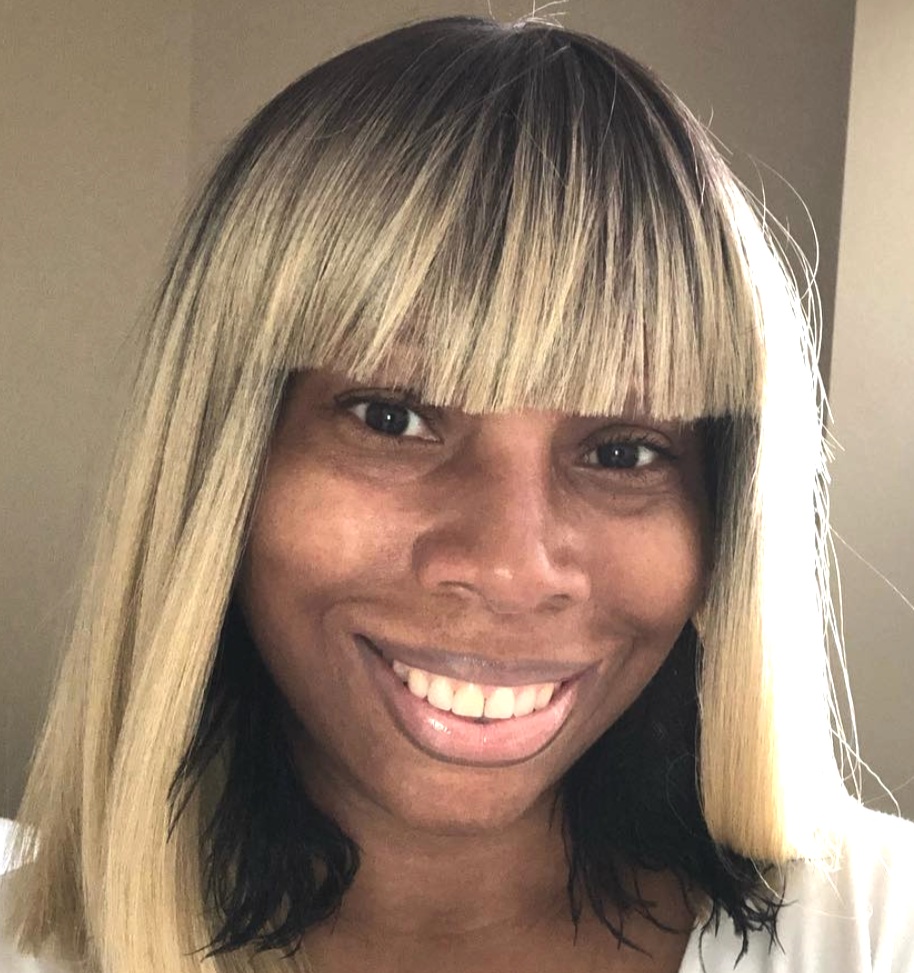
The diagnosis and treatment affected your sex life
I went into surgical menopause. There’s vaginal dryness, there’s lack of lubrication, [and] there can be pain and discomfort. I had constipation, and I also had tumors. I didn’t know at the time, but they’re blocking, pressing up against your vagina or your urethra, things like that.
There’s all these things that impact sex, and so you have to find another way to connect with your partner. It may not always be sexual intercourse.
I think that’s where the intimacy comes in and where the true foundation of your relationship comes in. I don’t even know the last time I had sex, to be honest with you, because it’s just not a desire at all.
Fortunately my boyfriend is really, really, just so supportive. He doesn’t even ask. Nothing. He’s just supportive, and it has changed our relationship to where the emotional connection is a lot stronger.
Women, don’t be ashamed of what your body can’t do or what you don’t want to do. I think have open communication with your partner. Partners, just be sympathetic to what’s going on. That it’s a lot going on and the last thing that you’re thinking about is really having sex.
Mental & Emotional Support
What was mentally the hardest part of the experience?
I honestly feel like it was the toughest for me when I was at work and not really knowing that the tumors had come back. In hindsight, I could see I was very emotional at work.
I would be crying at work. It was extremely stressful, and so for me, I’m just fortunate that I’ve been able to be off work all of this time during treatment, during surgery, and all of that.
It hasn’t been super tough. There were some days, early on, where I would just feel like not woe is me, but just like I have to deal with this.
You know how people say cancer sucks? I think that is the best description of it ever. Cancer sucks. You know? It just sucks. I try not to focus on cancer or not. I don’t say, “F cancer.” I don’t talk negatively about cancer. I try not to give it any more power in my life than it already has. But it does suck.
There are just some days I don’t really feel like doing this. I don’t feel like going through the aftermath of chemo. Surgery has not been that tough for me. The chemo was the toughest of it all.
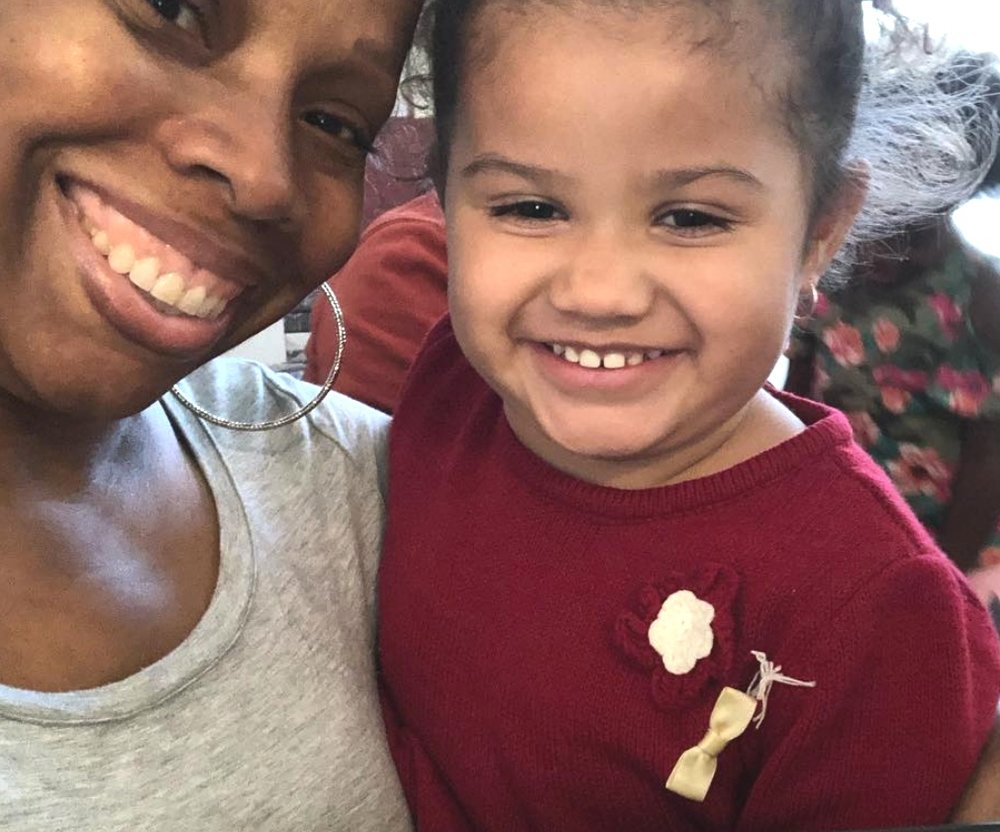
Why was chemo so difficult?
I was literally in bed for four days. Four days. I had chemo on Friday. I would probably be a little bit active on Saturday. Less active on Sunday, but in bed a lot. Then Monday, Tuesday, Wednesday, literally in the bed.
Just getting to use the bathroom and to get something to eat. But in the bed all day, and not even because I was just super fatigued.
I could still do my daily functions. I could still make my bed; I still made my bed every day. I still took a shower on most days. But you just have to rest.
The toughest was more dealing with the stomach issues, which made it like, “Oh my gosh, when is this gonna end?” You go to the bathroom, then you go lay down, and [in] two minutes you had to get back up to go to the bathroom. That’s what made it tough for me honestly.
What helped you get through those low moments?
God, prayers. There’s so many people praying for me and just checking on me. My support system is enormous, and it’s interesting because it’s people who I didn’t necessarily think would be my support system.
They are a part of my support system. People checking on me. Me doing the Facebook updates and everything, knowing that if I did a post on Monday and didn’t post again, they’d be like, “Hello? How are you? What’s going on?” Some people were really checking on me.
I just think this whole experience has really shown me how strong my faith in God is. I didn’t know it was that strong, but I just believe that my body is healed, I’m gonna be healed, and this experience has really been for me to share with other people just to raise awareness.
I have a friend who’s really been supportive. The whole time, he’s been like my daily confidant about what’s going on, how I’m feeling, giving me encouragement.
My brother moved in with me probably about three or four months ago. My niece is young, so [it’s been good] having them around. I have a really good family support system. My stepfather went to four of my six chemos with me. My mom went to one, and the last one I just went by myself. I just have a lot of support.
Any tips on how to deal with all the emotions?
I just choose to be positive. It is a choice. You have to be positive. You have to be positive.
Again, on those days when I’m feeling [down], I just have to remember, “You know what, Maurissa? This may not be what kills you; it could be something else. You don’t know. You don’t have any control over that. Don’t spend your time worrying about the cancer.” I can say that.
Some people will say, “Well, that’s easy for you to say. You’re off work.” I was getting 80% of my salary, just went down to 60% of my salary. I don’t have any children. I don’t have a husband. I have no responsibilities except for myself.
I truly understand that my situation is different than a lot of people’s situations in terms of women having young children, having children, or having people to look after. I don’t have those responsibilities per se.
Be your own advocate
I think self-advocacy is really important. Knowledge is power, but too much knowledge can create fear, so I think you have to learn for yourself how much information is enough information.
There’s a lot of information out about ovarian cancer, but my ovarian cancer is a rare type of ovarian cancer, so a lot of the information that was shared didn’t necessarily relate to me.
My diagnosis came after three surgeries, while a lot of people’s diagnoses will come after their first surgery. It’s kind of sprung upon them, so it’s all new to them. I think it’s really a matter of knowing what information is out there and then weeding through different things.
People, non-medical professionals, are going to tell you what worked for their family members, which is great, but their family member may or may not have had the same type of cancer that you had. We’re all individual people.
I think with the advocacy, the main thing is knowing your body and not being afraid to ask questions. I would send my oncologist a list of questions before my meetings to say, ‘These are things that I want to talk about.’ Then we would cover each and every one of them.
If you’re not comfortable with any doctor, then I think it’s on you to make the decision to change doctors. I know we don’t like to. We’re creatures of habit; we like comfort, but sometimes you have to change a doctor to get the help that you need.
We have to advocate for ourselves. I knew that I did not have irritable bowel syndrome or I had something in addition to irritable bowel syndrome. Because everything was showing up the same as if it was irritable bowel syndrome, that was the treatment plan.
I would say for women that you definitely have to advocate for yourselves and request different kinds of tests.
»MORE: How to be a self-advocate as a patient
Focusing on yourself first is critical
I am the backbone of my family, and so I had to really kind of step back and not take on their problems. I try to help them but just really focus on myself, but I just choose to be positive. I just have to be positive.
Even when I was sad about the doctor calling on Monday, I allowed myself to be sad and process that and think about that. Usually it only lasts a day — if it lasts that long — because the next day, I wake up and just feel so much joy in my spirit.
Almost like it’s a blessing to be going through what I’m going through, to be honest. I know that might sound crazy, but I feel like it’s a blessing to be chosen to spread awareness about this disease.
How important is it to have caregivers and ask for help?
It’s really important to have caregivers. It’s important to know who you are as a person. For me, I was determined to at least make my bed every day. That’s something I could do every day. Even if I got right out of bed, I would make my bed every day.
When my mom would come over, she would do little things around the house, but I didn’t take advantage of my caregivers or the support I was offered. I didn’t want to depend on it because I didn’t want to be in a position where I wasn’t mentally fighting the cancer myself.
But I think for women, it’s hard to ask for help. If there are people who want to help you, allow them to help you.
What I would say to caregivers or even people offering support is that it’s stressful. It was causing me anxiety to tell people, “I don’t need anything. I honestly don’t need anything. I feel fine; I’m good. I’m able to do the basic things that I need to do.”
My ex-husband lives down the street, and even though we’re divorced, he would pick food up for me on those first three to four days after the chemo so I wouldn’t have to worry about things like that.
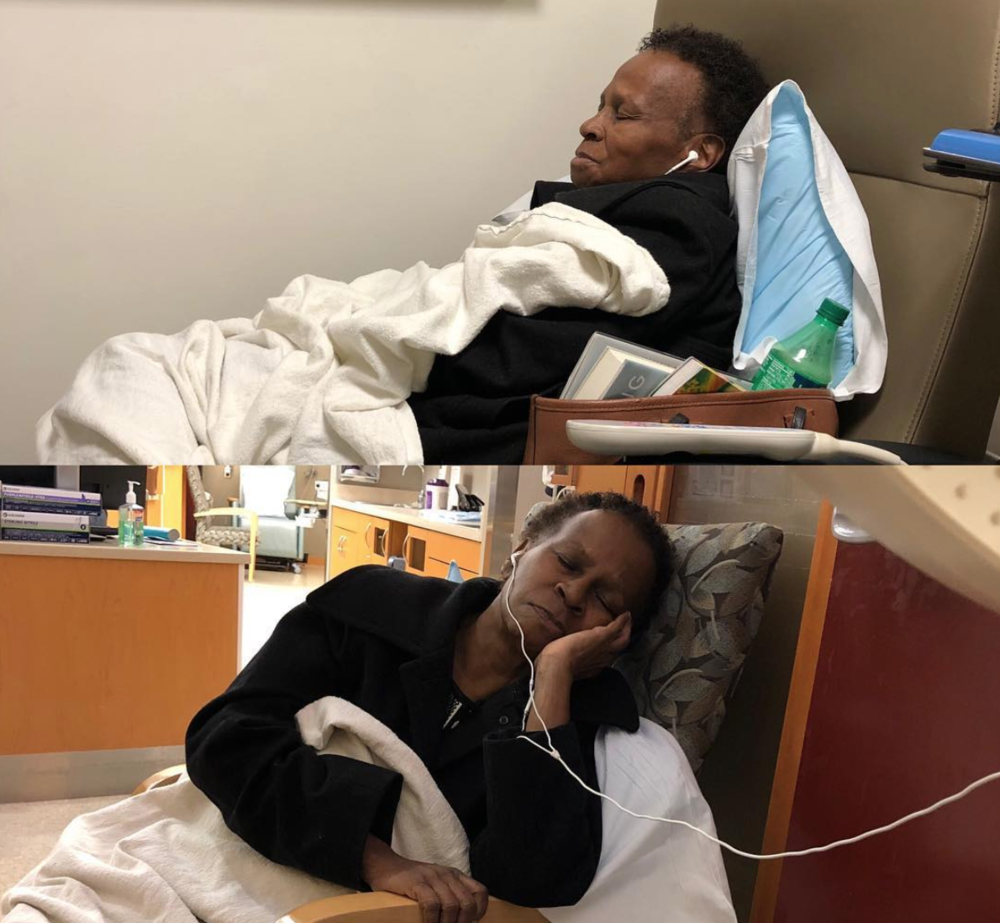
I would call in and say, “Hey, I need something.” It could be tricky when we’re recently divorced. It could be a little bit tricky, but it worked out.
I think caregivers are important. My stepfather going to chemo with me — he wanted to do that. Even though I sometimes drove us there and drove us back home, he wanted to do that. He wanted to be there with me to just provide the physical and emotional support.
If you have people who want to do that for you, just be upfront with them. I had a friend who was a breast cancer survivor. She wanted to go to chemo with me.
I just told her, “My days are long. I would see my doctor, and then I would have chemo, so my days are like six to eight hour days minimum. I appreciate it, but that’s too much to even ask of you. Plus my stepfather wants to go with me.”
Because I don’t have children or any of those other things that are pressing, I didn’t have to cook for anybody. If my clothes didn’t get washed, they didn’t get washed. If my house were dirty, my house was dirty.
I didn’t take people up on those things, but I do think that if that’s your situation, take people up on those things and tell them what you need. Tell them:
I need you to bring me some groceries, and these are the specific groceries that I need.
I need you to come help me wash my clothes.
Could you take the kids out for a while?
Could you prepare some dinners for the family for us?
I think it’s important to tell people what you need because people want to help. People want to help because it’s cancer. It’s the C word, the dirty C word.
I don’t think a lot of people have experienced cancer, and so they only know what they’ve heard from other people [and] what they’ve seen on television.
I just think it’s a matter of knowing who your support is and giving them what they need. My support, they needed my updates. They needed me to post on Facebook or Instagram or in my WhatsApp or send text messages to the people who weren’t on social media to let them know that I was doing okay.
They needed to see my face. I would do videos a lot so that they could see my face say, “Hey this is me, this is what’s going on.” My auntie wanted to see the whites of my eyes. I would be like, “Look, Auntie, here’s my eyes. Look and see.”
I think it’s dependent upon what you need individually and what your circle is able to provide to you.
Work & Finances
Would you have been able to work during your treatment if you wanted to?
My work is office work. I’m an administrator for Child Protective Services. It wasn’t the work in itself; it was more of the environment and the support that I felt that I was not receiving.
It was a lot of internalized emotions and stress. To be away from there was just a relief. I felt better the day the doctor said, ‘You can be off work.’ I felt amazing that day.
From there on, my spirit has just been really, really high because the work situation had been an ongoing situation for a few years where going back and forth on some assignments that just never seemed to be resolved, and I personally felt that my work was not being appreciated.
You know how that can go sometimes when you feel like you’re not appreciated. Not working has been a blessing for sure. Again, I could do that because part of my benefit package is I have short-term disability and long-term disability that pays me a percentage of my salary.
I just started 60% salary. I will just have to make whatever financial adjustments I have to make, because for me, my overall well-being is much more important.
»MORE: Read more on how others dealt with work after a cancer diagnosis
Describe your disability insurance
My short-term disability was for six months. It’s not state disability because I work for the government. We don’t pay into Social Security or state disability, so it’s part of my benefit package. That was for six months, and then long-term disability can go for two years.
Part of that, I had to apply for Social Security disability insurance. I applied for it with the Social Security Administration, and then I saw online that it was approved, but I don’t know what it means. I haven’t received any official notification from the Social Security Administration yet.
Any advice to others on how to deal with insurance and finances?
Look into some type of supplemental insurance while you’re healthy. I’m relatively healthy aside from the cancer diagnosis, but I can’t get any additional life insurance or supplemental insurance because I have a pre-existing condition.
I think you have to wait five years to be post-cancer, cancer-free to get any additional kind of insurance.
Fortunately, on top of my benefits through work, I did have a supplemental cancer policy through one of the insurance agencies, which provided financial assistance that paid for not monthly ongoing assistance, but lump sum for different things like benefits for surgery and diagnostic tests.
That has helped me along the way to supplement my income. I have to submit my claim for my chemo, where it’s $400 per treatment, so that’s like an additional $2400 that I will get.
If you don’t have supplemental insurance, if you don’t have life insurance, really look into those things. Even if it’s a hundred extra dollars a month, you have to figure out a way to pay for that, because you don’t know.
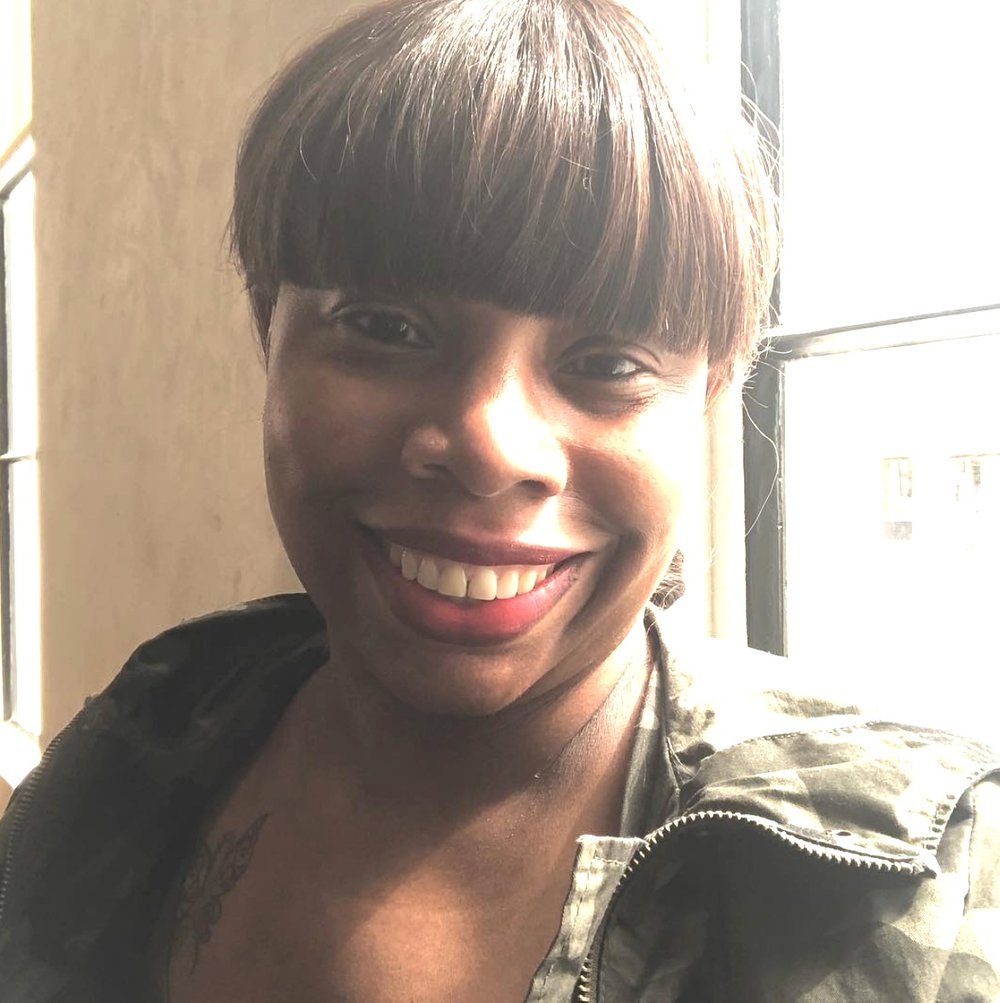
In addition to surviving, I’m overcoming cancer, but I never thought I would be doing a story about this. You just never know what life has to offer you, and so insurance is one of those things that we hate paying for it, but we’re happy to have it when we need it.
Again, I have really good insurance, but I just think it’s important as a country, as we talk about the government trying to repeal the Affordable Care Act or trying to decide who should have medical coverage, that medical coverage is not a privilege.
It should be a right for every single person, and I don’t think you should have to go through an illness to feel like somebody should have medical coverage.
I think that it should be something that everybody has. For me, going through this just opens my eyes up to how many people don’t have coverage and how many people aren’t able to get the treatment that they need.
I see this when I’m in the groups online and the ladies share that they don’t have insurance. They don’t have the means to afford care.
My friend’s father was going through treatment, and their treatment was so expensive they had to postpone chemo to see if they could get a discount from the manufacturer.
This is a man who, I believe, worked all his life, and his insurance didn’t cover it. I think it’s important that as a country, and as people, we’re just more sympathetic to people that we don’t know and that we provide medical coverage for all.
One More Message
First, I just want to say God bless you, and I’m really sorry that you’re dealing with this. It is a shocker, but I think in life things are never as bad as we imagine them to be.
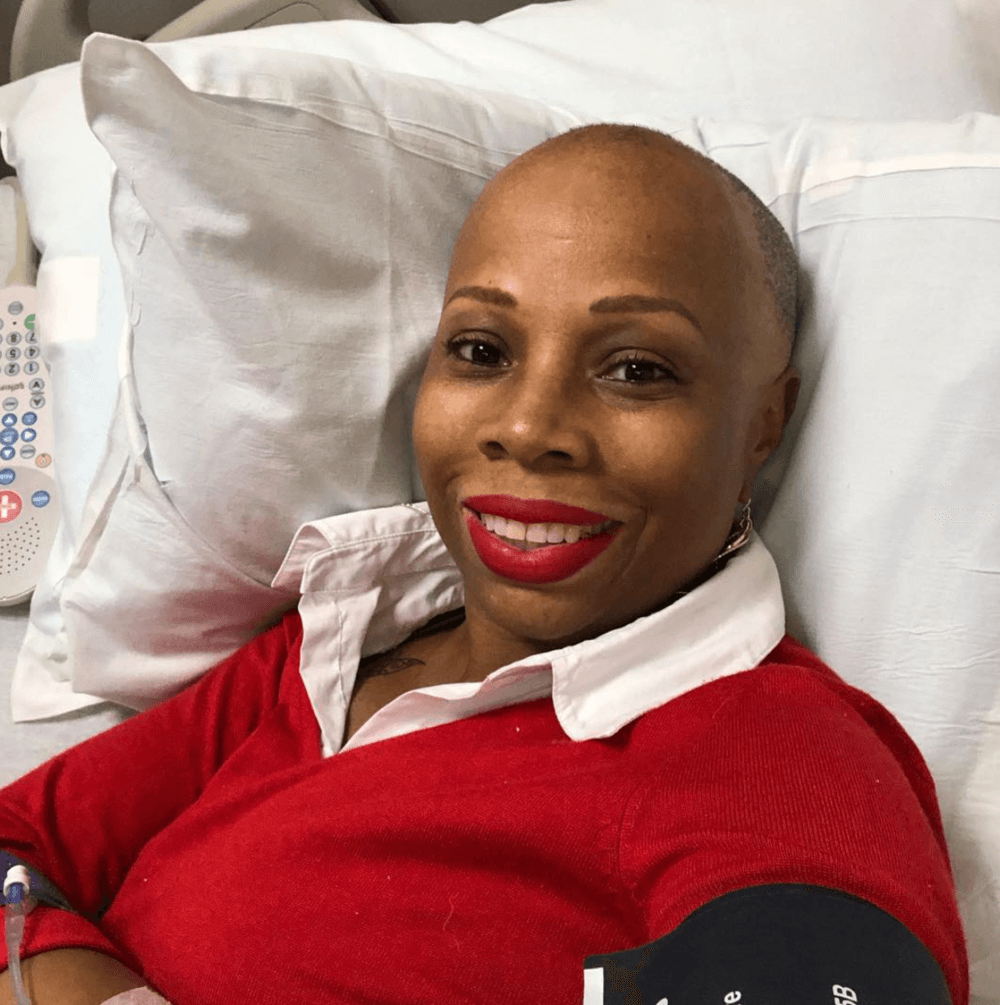
Given a diagnosis is a gut punch for sure. You have to believe that you’re strong enough, that you’re able to get through it.
Advocate for yourself; this is the time. Particularly women, this is the time to be selfish and to think about yourself and to put your needs first because we put everybody else’s needs first, and then we’re the ones [who] have to deal with this on top of other things.
I say stay positive. You have to stay positive. If people are negative around you, get them out of your circle or just tell them. My stepfather, bless his heart, was like, “You’re sick.” I was like, “I’m not sick. I have a condition. I’m not sick.”
I just refused to believe that I was sick. You just have to believe — whatever your faith is, whoever you believe that God is — that God loves you, that God is looking out for you, and that He’s gonna bring you through this, that He or She, whatever you believe, is gonna bring you through this.
For me, I just believe, okay, this too shall pass. This too shall pass, and what you’re going through is going to be a testimony or a breakthrough for somebody else.
Even if we all don’t make it through this journey, just us being on the journey provides information and research for those who come after us. It’s never in vain. It’s never in vain. I just wish you the best of luck.
For the care providers, thank you. Thank you particularly [to] husbands who are dealing with their wives or boyfriends with their girlfriends who can no longer — sex is not even on the table or on our minds at all. Your whole relationship has shifted.
Not just thank you for being there to support us and support the women who are going through this, because I think even though we may share some things, there may be some things that you just never know. That support is really appreciated.
The support of your significant other, just be there and just kind of let you be in whatever that is. Happy, sad, mad, whatever — just let you be. That’s really important.
I just think God bless you and keep your head up. On those days that you feel bad, just feel bad, but I say one-day pity party. That’s it; that’s all.
Then after that, celebrate life because we’re living. We’re alive; we’re not dead, so celebrate life. Honestly, this too shall pass.

Inspired by Maurissa's story?
Share your story, too!
Ovarian Cancer, Low Grade Serous Stories
Maurissa M., Low-Grade Serous Ovarian Cancer
Symptoms: Pressure on bladder, throbbing pain, could feel growth on right side of abdominal area
Treatments: 5 surgeries (official diagnosis after 3rd)
...
Alisa M., Low-Grade Serous Ovarian Cancer
Symptoms: Occasional rectal pain, acid reflux, bloating, night sweats
Treatments: Debulking surgeries, chemotherapy, immunotherapy
...
Cheyann S., Low-Grade Serous Ovarian Cancer, Stage 4B
Symptoms: Stomach pain, constipation, lump on the right side above pubic area
Treatments: Cancer debulking surgery, chemotherapy (carboplatin & Taxol, then Doxil & Avastin)
...
Kacie K., Low-Grade Serous Ovarian Cancer, Stage 3
Symptoms: Pelvic pain, sharp pains during menstrual periods, Inability to urinate normally, bleeding
Treatments: Surgeries (full hysterectomy, ostomy surgery, ostomy reversal surgery), chemotherapy
...
